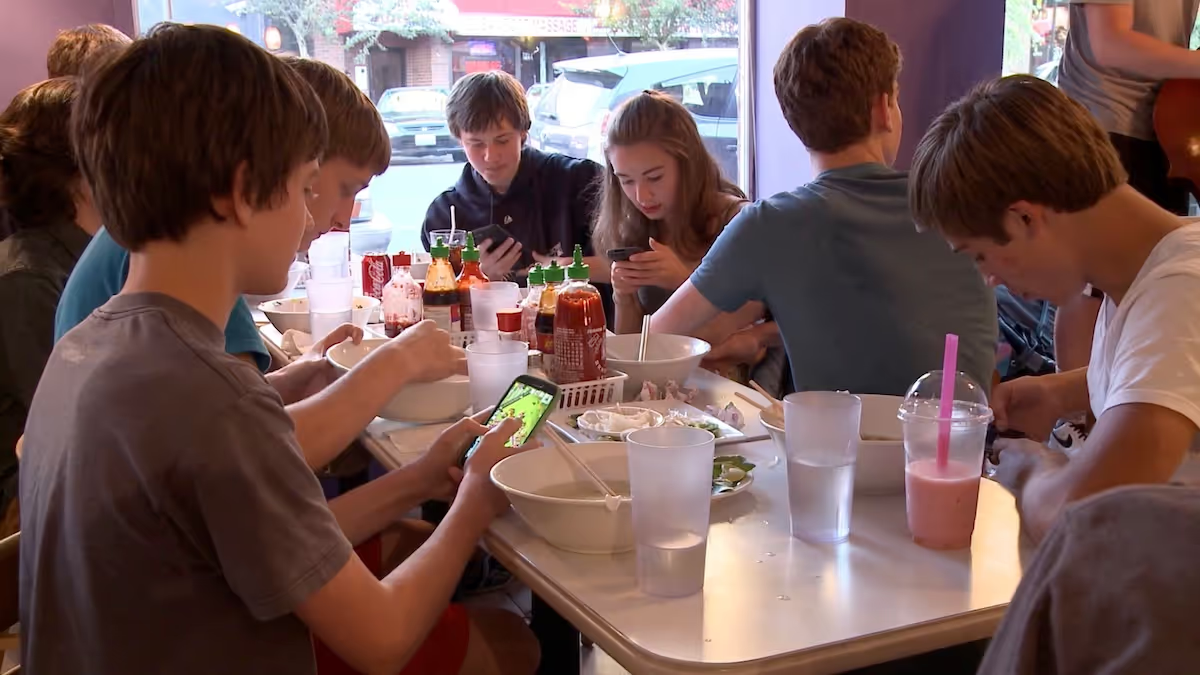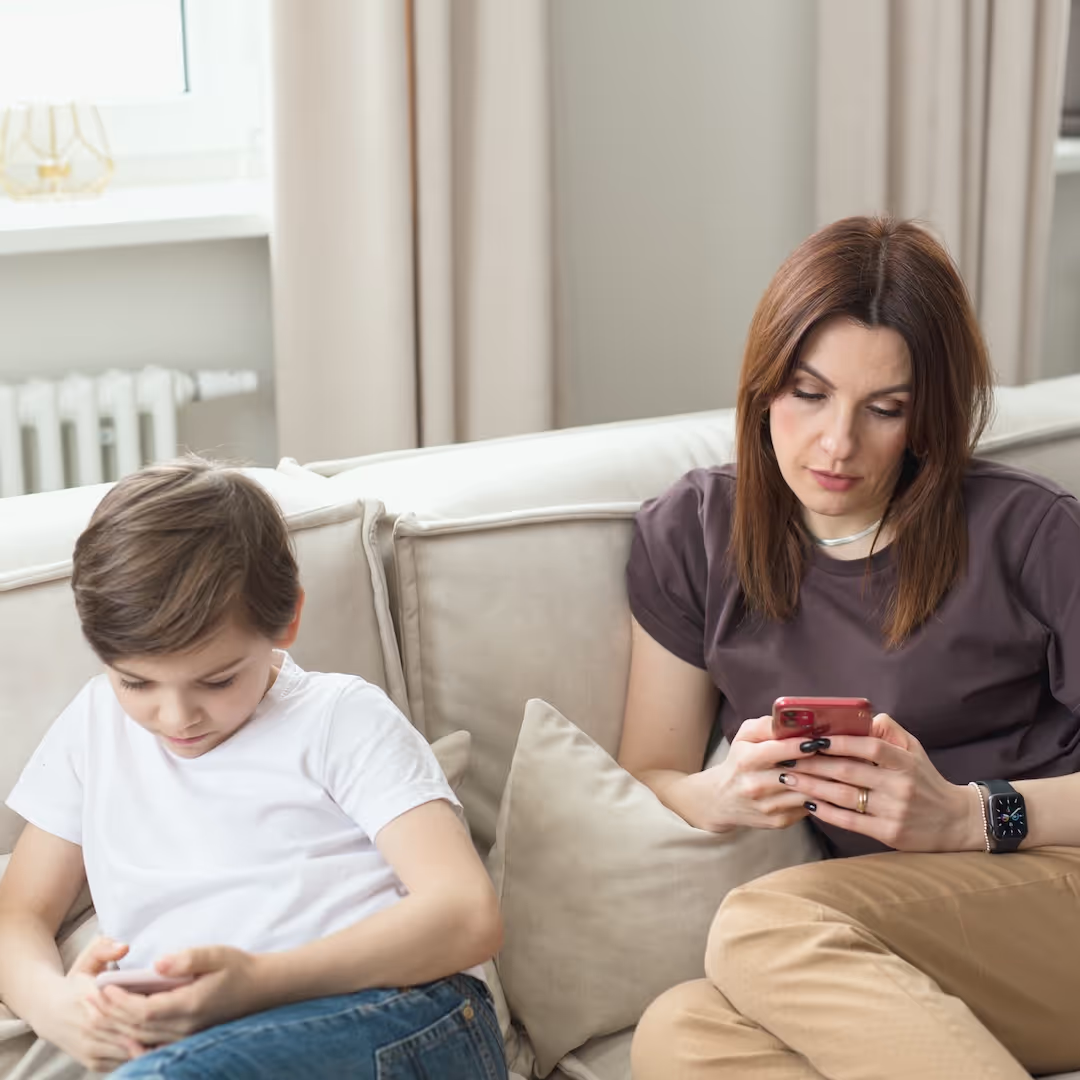


Do you know a teen or young adult who wishes they didn’t spend so much time on social media—who’s tried to cut back but finds it really tough? Many teens are in this exact boat. I see it all the time in my clinic, in my home, and at screenings of the four Screenagers films.
Recently, a mom asked me if there was anything out there to help her daughter reduce screen time, because her daughter wanted help. The truth is, there aren’t many structured programs for teens—but I was excited to tell her about a free, peer-led initiative I co-created with the Screenagers team, shaped by input from dozens of teens. It’s designed to help young people support each other in making healthier screen choices. It can be started as a new club or easily integrated into an existing one. Curious? Head to Boostingbravery.com.
But I still wanted to offer this mom’s daughter, and everyone interested, some tools right away to help be able to pull back. So I decided to create a podcast episode with a thoughtful researcher whose work offers valuable insights that address just that.
In today’s blog, I’m sharing insights from that episode along with one action step, in the form of a brilliant little question that we can pose to ourselves before clicking on an app.
Learn more about showing our movies in your school or community!
Join Screenagers filmmaker Delaney Ruston MD for our latest Podcast

Learn more about our Screen-Free Sleep campaign at the website!
Our movie made for parents and educators of younger kids
Learn more about showing our movies in your school or community!
Ever opened social media because you were feeling bored, only to feel even more bored afterwards? You’re not alone—research shows this is a common experience. In our latest Parenting in the Screen Age episode, Katie Davis, PhD, a leading expert on teens and technology, shares surprising findings from her recent study on teen Instagram use.
Dr. Davis is a professor at the University of Washington’s Information School, co-director of the UW Digital Youth Lab, and the author of numerous studies and three books exploring how technology impacts young people’s learning, development, and mental health.
One of the most striking findings from her research? Teens who scroll out of boredom often report feeling more bored afterward. Davis calls this “boredom in, boredom out.”
But it’s not just about boredom. How teens engage on social media makes a huge difference. Davis found that when teens use apps with intention — like messaging a friend, posting something meaningful, or searching for specific content — they tend to feel more positive emotions, such as confidence, pride, and gratitude. On the other hand, passive scrolling (watching Reels, browsing feeds) often leaves them feeling flat or even worse.
The episode explores how a simple shift in mindset—adding intentionality—can transform screen time. One powerful takeaway? Before opening an app, ask yourself: “What will I do afterwards?” That pause and question can make a big difference.
Want to help teens make healthier digital choices? Have them listen to the podcast episode with you. It is packed with research, practical tools, and real-life reflections—including one from a college student navigating her own Instagram habits.
Learn more about showing our movies in your school or community!
Join Screenagers filmmaker Delaney Ruston MD for our latest Podcast

Learn more about our Screen-Free Sleep campaign at the website!
Our movie made for parents and educators of younger kids
Join Screenagers filmmaker Delaney Ruston MD for our latest Podcast
Be sure to subscribe to our YouTube Channel! We add new videos regularly and you'll find over 100 videos covering parenting advice, guidance, podcasts, movie clips and more. Here's our most recent:
As we’re about to celebrate 10 years of Screenagers, we want to hear what’s been most helpful and what you’d like to see next.
Please click here to share your thoughts with us in our community survey. It only takes 5–10 minutes, and everyone who completes it will be entered to win one of five $50 Amazon vouchers.
Do you know a teen or young adult who wishes they didn’t spend so much time on social media—who’s tried to cut back but finds it really tough? Many teens are in this exact boat. I see it all the time in my clinic, in my home, and at screenings of the four Screenagers films.
Recently, a mom asked me if there was anything out there to help her daughter reduce screen time, because her daughter wanted help. The truth is, there aren’t many structured programs for teens—but I was excited to tell her about a free, peer-led initiative I co-created with the Screenagers team, shaped by input from dozens of teens. It’s designed to help young people support each other in making healthier screen choices. It can be started as a new club or easily integrated into an existing one. Curious? Head to Boostingbravery.com.
But I still wanted to offer this mom’s daughter, and everyone interested, some tools right away to help be able to pull back. So I decided to create a podcast episode with a thoughtful researcher whose work offers valuable insights that address just that.
In today’s blog, I’m sharing insights from that episode along with one action step, in the form of a brilliant little question that we can pose to ourselves before clicking on an app.
Ever opened social media because you were feeling bored, only to feel even more bored afterwards? You’re not alone—research shows this is a common experience. In our latest Parenting in the Screen Age episode, Katie Davis, PhD, a leading expert on teens and technology, shares surprising findings from her recent study on teen Instagram use.
Dr. Davis is a professor at the University of Washington’s Information School, co-director of the UW Digital Youth Lab, and the author of numerous studies and three books exploring how technology impacts young people’s learning, development, and mental health.
One of the most striking findings from her research? Teens who scroll out of boredom often report feeling more bored afterward. Davis calls this “boredom in, boredom out.”
But it’s not just about boredom. How teens engage on social media makes a huge difference. Davis found that when teens use apps with intention — like messaging a friend, posting something meaningful, or searching for specific content — they tend to feel more positive emotions, such as confidence, pride, and gratitude. On the other hand, passive scrolling (watching Reels, browsing feeds) often leaves them feeling flat or even worse.
The episode explores how a simple shift in mindset—adding intentionality—can transform screen time. One powerful takeaway? Before opening an app, ask yourself: “What will I do afterwards?” That pause and question can make a big difference.
Want to help teens make healthier digital choices? Have them listen to the podcast episode with you. It is packed with research, practical tools, and real-life reflections—including one from a college student navigating her own Instagram habits.
Be sure to subscribe to our YouTube Channel! We add new videos regularly and you'll find over 100 videos covering parenting advice, guidance, podcasts, movie clips and more. Here's our most recent:
Sign up here to receive the weekly Tech Talk Tuesdays newsletter from Screenagers filmmaker Delaney Ruston MD.
We respect your privacy.
Do you know a teen or young adult who wishes they didn’t spend so much time on social media—who’s tried to cut back but finds it really tough? Many teens are in this exact boat. I see it all the time in my clinic, in my home, and at screenings of the four Screenagers films.
Recently, a mom asked me if there was anything out there to help her daughter reduce screen time, because her daughter wanted help. The truth is, there aren’t many structured programs for teens—but I was excited to tell her about a free, peer-led initiative I co-created with the Screenagers team, shaped by input from dozens of teens. It’s designed to help young people support each other in making healthier screen choices. It can be started as a new club or easily integrated into an existing one. Curious? Head to Boostingbravery.com.
But I still wanted to offer this mom’s daughter, and everyone interested, some tools right away to help be able to pull back. So I decided to create a podcast episode with a thoughtful researcher whose work offers valuable insights that address just that.
In today’s blog, I’m sharing insights from that episode along with one action step, in the form of a brilliant little question that we can pose to ourselves before clicking on an app.

Instagram’s new Teen Accounts are being promoted as safer for kids, but recent nationally representative data tells a more complicated story. This post invites families to take a research-based quiz together and have a calm, curiosity-driven conversation about what teens are actually experiencing on the platform — and what that means for trust, safety, and screen time.
READ MORE >
It feels like we’re finally hitting a tipping point. The harms from social media in young people’s lives have been building for far too long, and bold solutions can’t wait any longer. That’s why what just happened in Australia is extremely exciting. Their new nationwide move marks one of the biggest attempts yet to protect kids online. And as we released a new podcast episode yesterday featuring a mother who lost her 14-year-old son after a tragic connection made through social media, I couldn’t help but think: this is exactly the kind of real-world action families have been desperate for. In today’s blog, I share five key things to understand about what Australia is doing because it’s big, it’s controversial, and it might just spark global change.
READ MORE >
I hear from so many parents who feel conflicted about their own phone habits when it comes to modeling healthy use for their kids. They’ll say, “I tell my kids to get off their screens, but then I’m on mine all the time.” Today I introduce two moms who are taking on my One Small Change Challenge and share how you can try it too.
READ MORE >for more like this, DR. DELANEY RUSTON'S NEW BOOK, PARENTING IN THE SCREEN AGE, IS THE DEFINITIVE GUIDE FOR TODAY’S PARENTS. WITH INSIGHTS ON SCREEN TIME FROM RESEARCHERS, INPUT FROM KIDS & TEENS, THIS BOOK IS PACKED WITH SOLUTIONS FOR HOW TO START AND SUSTAIN PRODUCTIVE FAMILY TALKS ABOUT TECHNOLOGY AND IT’S IMPACT ON OUR MENTAL WELLBEING.
